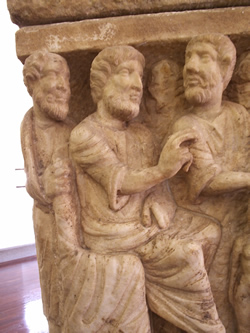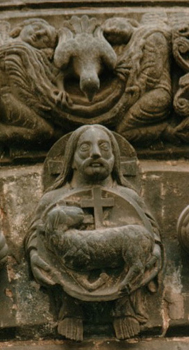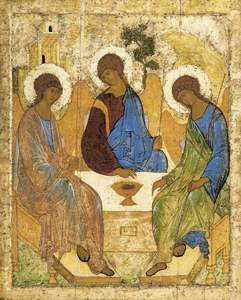The Best of All Beginnings
A guest essay by Debie Thomas. Thomas holds an MFA in Creative Writing from the Ohio State University. Her essays have appeared in the Kenyon Review, River Teeth: A Journal of Nonfiction Narrative, and Slate Magazine. She lives in the San Francisco Bay Area with her family.
For Sunday June 15, 2014
Trinity Sunday
Lectionary Readings (Revised Common Lectionary, Year A)
Genesis 1:1–2:4
Psalm 8
2 Corinthians 13:11–13
Matthew 28:16–20
"Where do you come from?"
It's a question I heard often, growing up. My parents would ask it in the grocery store, or on the playground, or at church — wherever we met people who looked, dressed, or spoke like us. As immigrants from India, homesick and still adjusting to life in the United States, my parents loved to forge connections with other Indians, and those connections always began with origins.
"Where are you from?" "Where is your home?" "Who are your people?" We told our stories to identify our origins.
 |
Dogmatic sarcophagus, earliest image of the Trinity, c. 320-350, Vatican Museum. |
This week's reading from Genesis is also an origin story — the origin story of humankind — and as such, it offers us surprisingly rich soil in which to root our identities. Neither history nor science as today's scholars understand those disciplines, the first chapter of Genesis is poetry, hymn, doxology, and myth. If we in the postmodern world struggle to see truth in those art forms, it is not because Scripture is lying. It is because our post-Enlightenment imaginations are impoverished. To call the creation story true is not to quibble with science; it is to probe deeper than any scientific endeavor can take us. It is to acknowledge who we truly are and where we really come from. It is to affirm, by faith, the reality of a good God, a good world, and a beloved humanity.
When I was growing up, I didn't pay much attention to Genesis 1. If anything, I skimmed over it in my eagerness to get to the more suspenseful snake-and-fruit dramas of chapters 2 and 3. Now though, I'm more inclined to savor the deep truths hidden in Scripture's opening verses. I can't say yet that I believe everything I've found. I can only say that I'm in awe of what the chapter tells me about my origins. Some of it feels too good to be true, but it's not. I long to believe every word.
Where do I come from? Here's what I've discovered so far:
I come from a God who sees. Seven times in the creation narrative, God pauses to reflect on his handiwork. "And God saw." Well before his work is done, he steps back to behold all that is taking shape before his eyes. Like a musician who thrills at a swelling harmony, like a poet who gasps at a beautiful turn of phrase, God lingers over his creation — every leaf, every wing, every stream, every child. He's not in a hurry, and his interest in the world is far from utilitarian. God's is the gaze of the artist, keen, perceptive, and patient. He observes. He attends. He notices. I come from a God who pays delighted attention. He sees.
I come from a world that is good. Before there was evil, there was goodness. Before there was Original Sin, there was Original Blessing. Often in our rush to get our theologies properly balanced and our egos properly squashed, we forget that Genesis 1 is a chapter brimming with goodness and blessing. In fact, God pronounces blessing on the created order three times. He calls creation "good" and "very good" seven times. As New Testament scholar Marcus Borg puts it, the creation story is "strikingly world-affirming." "Against all world-denying theologies and philosophies," he writes, "Genesis affirms the world as the good creation of the good God. All that is, is good."
 |
Trinity on the portal of the Basilica of St.-Denis, France, 12th century. |
What would it mean to believe this in a culture increasingly numb to violence, war, corruption, and greed? Would my eyes stop glazing over, would my heart be more pierced, if I really believed that the world's default setting — my default setting — is not evil, but radical, world-altering good? What would it be like to bless God's world without reservation, stinginess, or fear? What would it be like to incarnate the goodness that is my heritage? "God saw everything he had made, and indeed, it was very good."
I come from a God who makes new things. According to Genesis, God created something new each day for six days. He was an innovator at the world's beginning, calling forth beautiful things that didn't exist until he called them. But is he still an innovator now? Do I believe in a God who is stagnant or vibrant? A God whose creative work is finished or ongoing? Frederick Buechner writes, "Using the same old materials of earth, air, fire, and water, every twenty-four hours God creates something new out of them. If you think you're seeing the same show all over again seven times a week, you're crazy. Every morning you wake up to something that in all eternity never was before and never will be again. And the you that wakes up was never the same before and will never be the same again, either."
I come from the morning and the evening, the light and the darkness. Some versions of Christianity are rife with dualisms: we call the spirit good and the body bad. We believe that light comes from God and darkness comes from the devil. But the Genesis story contradicts these oppositions. The God who is spirit blesses the body. The God who creates light calls evening "good." The God who brings order also hovers over the chaotic deep.
In her recent book on spirituality and darkness, Barbara Brown Taylor writes, "The way most people talk about darkness, you would think that it came from a whole different deity, but no. To be human is to live by sunlight and moonlight, with anxiety and delight, admitting limits and transcending them, falling down and rising up. To want a life with only half of these things in it is to want half a life, shutting the other half away where it will not interfere with one's bright fantasies of the way things ought to be."
 |
Trinity icon by Andrei Rublev, 1410. |
I come from the likeness of God. Biblical scholars don't know for sure what the Imago Dei of Genesis means. Am I like God in my spiritual traits? In my physical form? In my consciousness or creativity? I don't know, but the possibilities are breathtaking to imagine. If nothing else, the creation story insists that God's mark is imprinted on my very being. I might ignore or distort it, but the mark is always there. Whether I acknowledge it or not, I reflect something of God's joy, God's intentions, God's love, and God's beauty just by virtue of existing on the earth. I am His, and so He is mine.
I come from a God who rests. Honoring this is no small feat in workaholic America, where every hour of every day is measured in profits gained or advantages lost. For me, the Sabbath doesn't come naturally. I forget about it. I fear it. I resist it. To remember that God rested is to be both startled and humbled. How dare I claim not to need a break when God Himself took one? The Sabbath is the only thing in the creation account God called holy. I would do well to pay attention.
My parents still ask the "Where do you come from?" questions, and these days, I ask them, too. Not to highlight differences, but to reach across those differences and learn how much we have in common. Genesis 1 assures us that we're on solid ground as we attempt these connections. Where do we come from? We come from the best of beginnings. We come from a glorious Creator. We come from the loving heart of God.
Image credits: (1) Wikipedia.org; (2) Wikipedia.org; and (3) Wikipedia.org.





